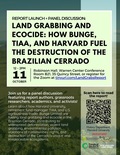|
|
Liquid Gold: Why Africa's Untapped LNG Sector Must Power Its Food Economy |
|
11 OCT 2023
Online
|
Land Grabbing and Ecocide: How Bunge, TIAA, and Harvard Fuel the Destruction of the Brazilian Cerrado
Network for Social Justice and Human Rights
|
|
26 AUG 2023
Bure, France
|
Rencontre des luttes paysannes et rurales
LPR
|
|
26 AUG 2023
Bure, France
|
Gathering of rural and peasant struggles
RLP
|
|
26 AUG 2023
Bure, Francia
|
Encuentros de las luchas campesinas y rurales
LPR
|
|
29 MAR 2023
|
War and Water in the Horn of Africa (Virtual Event)
The Nile is crucial to the health, economy, and cultures of 11 African countries, but land grabs and agribusiness investments threaten its accessibility. Pulitzer Centre
|
|
31 JAN 2023
Online
|
Occupation of territories by foreign companies: impacts on local populations
The 4th round of the Global Forum of Struggles for Land and Natural Resources, coordinated by CONTAG, aims to inform and report on the reality in Brazil. CONTAG
|
|
31 JAN 2023
online
|
Ocupação de territórios por empresas estrangeiras: impactos sobre as populações locais
A 4ª rodada do Fórum Global de Lutas pela Terra e Recursos Naturais, coordenado pela CONTAG, tem como objetivo informar sobre esse tema. CONTAG
|
|
24 JAN 2023
Online
|
Webinar: A Look at the State of Food Estates
Why are Food Estates being set-up in West Papua, Indonesia and other parts of the world and who benefits TAPOL, awasMIFEE & GRAIN
|
|
15 DEC 2022
Online
|
On Just Grounds: Land, Food, and Rights Amid Crisis and Conflicts
In commemoration of International Human Rights Day, the People’s Coalition for Food Sovereignty and PAN Asia Pacific is holding this webinar on December 15, tackling the intersections of land, food, and human rights amid the global food crisis and conflicts. PCFS, PANAP
|
|
06 DEC 2022
Online
|
Reclaiming Our Stories
Results from participatory feminist research projects led by social movements from 5 countries on the impacts of corporate capture on land, housing and natural resources. ESCR-NEt
|
Who's involved?
Carbon land deals
Languages
- Amharic
- Bahasa Indonesia
- Català
- Dansk
- Deutsch
- English
- Español
- français
- Italiano
- Kurdish
- Malagasy
- Nederlands
- Português
- Suomi
- Svenska
- Türkçe
- العربي
- 日本語
Special content
Archives
Latest posts
-

KKR acquires ProTen from Aware Super
- Business Wire
- 01 July 2025
-

CAR offers land ownership using cryptocurrency
- IT Web
- 23 June 2025



















